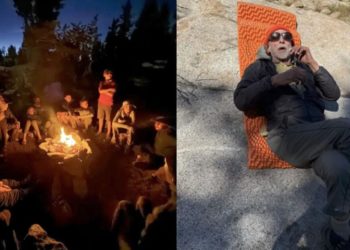In the central African nation of Cameroon, rebels seeking to create a new country for English speakers have a resolute anthem that envisions a bloody struggle birthing a “nation flowing with milk and honey.” Their striped sky-blue flag features a white dove.
For years, separatist leaders have exhorted compatriots abroad to bankroll the insurgency, striving to form a sovereign country called Ambazonia. On Friday, they suffered a major setback some 6,500 miles from the front lines of a conflict that has killed thousands when federal law enforcement officials in Minnesota indicted two leaders of the movement, both naturalized U.S. citizens.
According to the indictment, commanders of the so-called Ambazonia Defense Forces living abroad have overseen a yearslong violent campaign in Cameroon that included bombings, executions and kidnappings. While leading seemingly ordinary middle-class lives in the United States, the leaders wired tens of thousands of dollars and handed down orders to fighters on the ground over WhatsApp group chats, prosecutors said.
Two of the men calling the shots, according to prosecutors, were Benedict Nwana Kuah, 51, of Woodbury, Minn., and Pascale Pascal Kikishy Wongbi, 52, of Ramsey City, Minn. Both were taken into custody on Friday.
Mr. Kuah and Mr. Wongbi were charged with conspiracy to kill, kidnap, maim and injure persons abroad; and conspiracy to launder money. Mr. Kuah faces additional charges of conspiring to take someone hostage and conspiring to use weapons of mass destruction overseas. If convicted, they could face up to life in prison.
It was not immediately clear on Friday whether the men had retained lawyers. They will most likely have a hearing next week to determine whether they should remain in custody pending trial. Efforts to reach leaders of the group for comment by phone, email and social media did not lead to a response.
Mr. Kuah, who uses the title chairman of the war council of the Ambazonia Defense Forces, is the movement’s top military leader. Mr. Wongbi, a member of the war council, uses the title head of defense, logistics and human resources, according to prosecutors.
“Minnesota is not a launchpad for overseas violence,” Joseph H. Thompson, the acting U.S. attorney for Minnesota, said in a statement. “Operating from the comfort of their living rooms in Minnesota, these defendants caused violence and suffering half a world away.”
More than 89,000 Cameroonians lived in the United States in 2022, according to U.S. census data. Their community in Minnesota, while small, has grown rapidly in recent years.
The origins of the conflict that sparked the armed separatist movement date back to Cameroon’s turbulent decolonization period in the 1960s. After gaining independence, regions that had been French and British colonies coexisted uneasily for decades in a new nation.
Anglophones in western Cameroon, a nation home to more than 30 million people, have long felt marginalized by the French-speaking majority. Their grievances came to a boil during protests in 2016, led by teachers and lawyers complaining that the government appointed non-English speakers to run their schools and courts. The government used violence to quiet the resistance, according to human rights groups.
In 2017, separatist rebels began attacking military installations and exerting control over English-speaking regions, often blocking roads and imposing draconian lockdowns. The conflict escalated over the years as the country’s military, which has received training from the United States and France, sought to quash the separatist movement.
In 2023, Amnesty International said both sides had “committed atrocities” against civilians. The group said the military, led by an autocratic president who has been in power for more than four decades, carried out unlawful killings, committed acts of sexual violence and destroyed homes. Separatists, the group said, have murdered, tortured and abducted civilians.
A Human Rights Watch report last year said an estimated 6,000 people had died in clashes between separatists and government forces. Hundreds of thousands have been displaced.
As the violence escalated, the separatists began acting as a de facto government in the western edge of the country, led by the so-called Ambazonia Governing Council, which was largely led by members of the country’s diaspora.
Key among them were Mr. Kuah and Mr. Wongbi, according to the indictment. Since 2017, the men have acted as commanders in exile, fund-raisers and spokesmen for the separatist movement, the indictment says.
In videos posted online, both men called for the killing of civilians believed to be government loyalists, whom they referred to as “blacklegs” and “enablers,” according to prosecutors.
They said that in 2021, using the group’s social media accounts, both men called on fellow Cameroonians abroad to donate money for a “takeover fund,” used to make rudimentary roadside bombs, which the separatists referred to as “pops” and “popcorn.” In online appeals, separatist leaders called donations for the fighters a “liberation tax.”
Among the group’s highest-profile crimes was the April 2022 kidnapping of Senator Elizabeth Regina Mundi, who was then 79 years old and part of the country’s ruling party. Ms. Mundi was forced to record a statement in captivity in which she pledged allegiance to the separatist movement and said: “Long live the Republic of Ambazonia.”
Debating her fate in the commanders’ WhatsApp group, according to prosecutors, Mr. Kuah wrote: “THIS WOMAN WILL NOT GO FREE.” Mr. Wongbi suggested she be executed, writing: “take her out ASAP!”
The Cameroonian military rescued Ms. Mundi a month after her abduction, prosecutors said, an outcome Mr. Kuah lamented in a video posted online, calling it a “heartbreaking situation.”
Later that month, prosecutors added, Mr. Kuah launched a new fund-raising campaign online called “Operation 200 AKs,” seeking money for new rifles. It urged Cameroonians abroad to “turn your anger into guns, your frustration into guns and your hope into even more guns.”
Over the next year, scores of donations poured in, netting more than $31,000, which was wired to fighters on the ground, according to the indictment.
Dionne Searcey contributed reporting.
Ernesto Londoño is a Times reporter based in Minnesota, covering news in the Midwest and drug use and counternarcotics policy.
The post Leaders of African Separatist Movement Indicted in Minnesota appeared first on New York Times.




